

EC: Ban on animal testing. NYT: E.U. Bans Cosmetics With Animal-Tested Ingredients. BBC: EU bans sale of all animal-tested cosmetics. 11 March 2013Last updated at 13:23 ET The search for alternatives to animal testing goes on A complete ban on the sale of cosmetics developed through animal testing has taken effect in the EU.
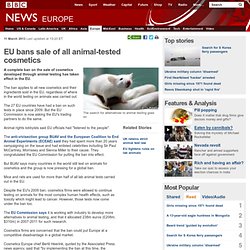
The ban applies to all new cosmetics and their ingredients sold in the EU, regardless of where in the world testing on animals was carried out. The 27 EU countries have had a ban on such tests in place since 2009. But the EU Commission is now asking the EU's trading partners to do the same. Animal rights lobbyists said EU officials had "listened to the people". The anti-vivisection group BUAV and the European Coalition to End Animal Experiments (ECEAE) said they had spent more than 20 years campaigning on the issue and had enlisted celebrities including Sir Paul McCartney, Morrissey and Sienna Miller to their cause.
Episkin - l'oreal laboratory. L'Oreal Makes Fake Skin as Animal Testing Ban Looms. INVITROSKIN : L’Oréal cutaneous tissue engineering platform. Jane Fonda visits the research lab at L'Oreal. Kérastase Patricia Pineau directrice communication scientifique L'Oréal Recherche & Innovation. L'Oreal answers on animal testing. L’Oréal is committed to only market products whose safety has been evaluated according to rigorous and ethical protocols.
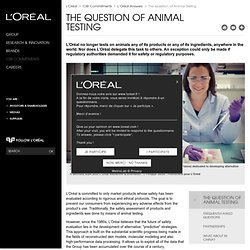
The goal is to prevent our consumers from experiencing any adverse effects from the product’s use. Traditionally, the safety assessment of products and ingredients was done by means of animal testing. However, since the 1980s, L’Oréal believes that the future of safety evaluation lies in the development of alternative, "predictive" strategies. This approach is built on the substantial scientific progress being made in the fields of reconstructed skin models, molecular modeling and also high-performance data processing. It allows us to exploit all of the data that the Group has been accumulated over the course of a century, representing over 50 000 ingredients. These new strategies and the considerable research efforts behind them have paid off: in 1989, L’Oréal was able to end all testing of its products on animals, without making our products any less safe. L'Oreal buys back into tests on animals.
Tried and tested: Activists from an animal rights group protest against animal testing.
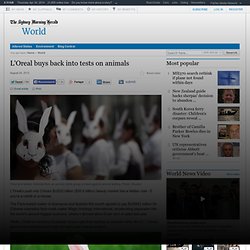
Photo: Reuters L'Oreal's push into China's $US32 billion ($35.6 billion) beauty market has a hidden cost - if you're a rabbit or a mouse. The Paris-based maker of shampoos and lipsticks this month agreed to pay $US843 million for Chinese cosmetics face-mask maker Magic Holdings International, accelerating expansion into the world's second-biggest economy, where it derived about 6 per cent of sales last year. China Animal Testing Complicates L’Oreal’s Expansion. L’Oreal SA’s (OR) push into China’s $32 billion beauty market has a hidden cost -- if you’re a rabbit or a mouse.
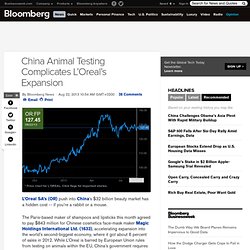
The Paris-based maker of shampoos and lipsticks this month agreed to pay $843 million for Chinese cosmetics face-mask maker Magic Holdings International Ltd. (1633), accelerating expansion into the world’s second-biggest economy, where it got about 6 percent of sales in 2012. While L’Oreal is barred by European Union rules from testing on animals within the EU, China’s government requires such trials for every new beauty product. China is the only major market where companies must test their mascaras and lotions on animals. Rabbits are killed or ingredients dripped into their eyes during Chinese tests, according to London-based animal-rights group Cruelty Free International. India last month banned animal testing for beauty products. A Chinese researcher injects a monkey with an experimental solution at a laboratory in Guangzhou. Close Open 300,000 Animals. Animal testing complicates cosmetics giant L'Oreal's push into China. Thursday, September 26, 2013 | By: Elizabeth Culliford The words “Made in China”, stamped on the underbelly of every plastic dinosaur and action figures handled in childhood, have become tainted in popular culture.
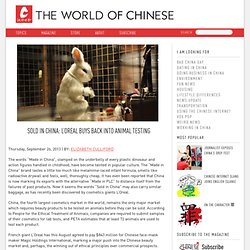
The “Made in China” brand tastes a little too much like melamime-laced infant formula, smells like radioactive drywall and feels, well, thoroughly cheap. Body Shop ethics under fire after Colombian peasant evictions. The Body Shop, the cosmetics giant that claims to source ingredients from companies that protect local farmers' rights, buys palm oil from an organisation that pushed for the eviction of peasant families to develop a new plantation.
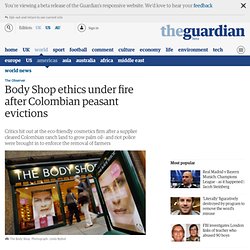
Daabon Organics, a Colombian firm that provides the British chain with 90% of all its palm oil, was part of a consortium that asked the courts to remove farmers from a sprawling ranch 320km north of the capital Bogotá with a plan to grow African palm. The Body Shop. The Body Shop International PLC, known as The Body Shop, has a range consisting of 1,200 products, including cosmetics and make-up in its 2,500 franchised stores in 61[2] countries.
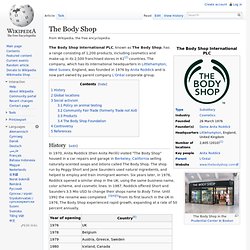
The company, which has its international headquarters in Littlehampton, West Sussex, England, was founded in 1976 by Anita Roddick and is now part owned by parent company L'Oréal corporate group. History[edit] In 1970, Anita Roddick (then Anita Perilli) visited "The Body Shop" housed in a car repairs and garage in Berkeley, California selling naturally-scented soaps and lotions called The Body Shop.
The shop run by Peggy Short and Jane Saunders used natural ingredients, and helped to employ and train immigrant women. Six years later, in 1976, Roddick opened a similar shop in the UK, using the same business name, color scheme, and cosmetic lines.